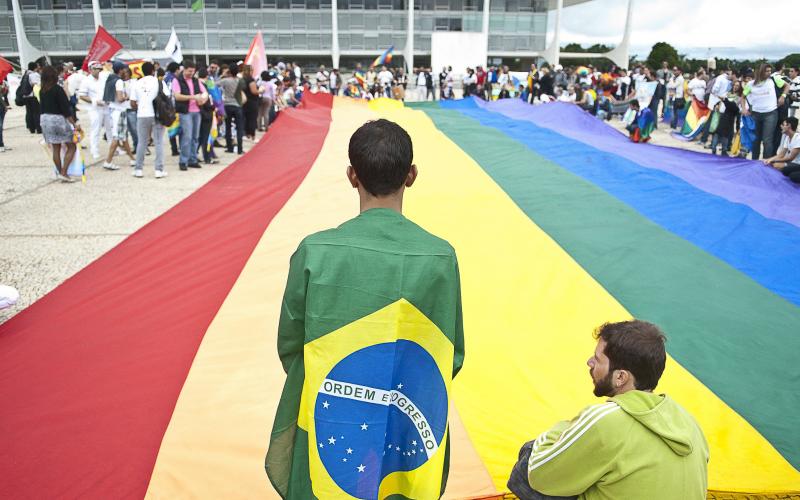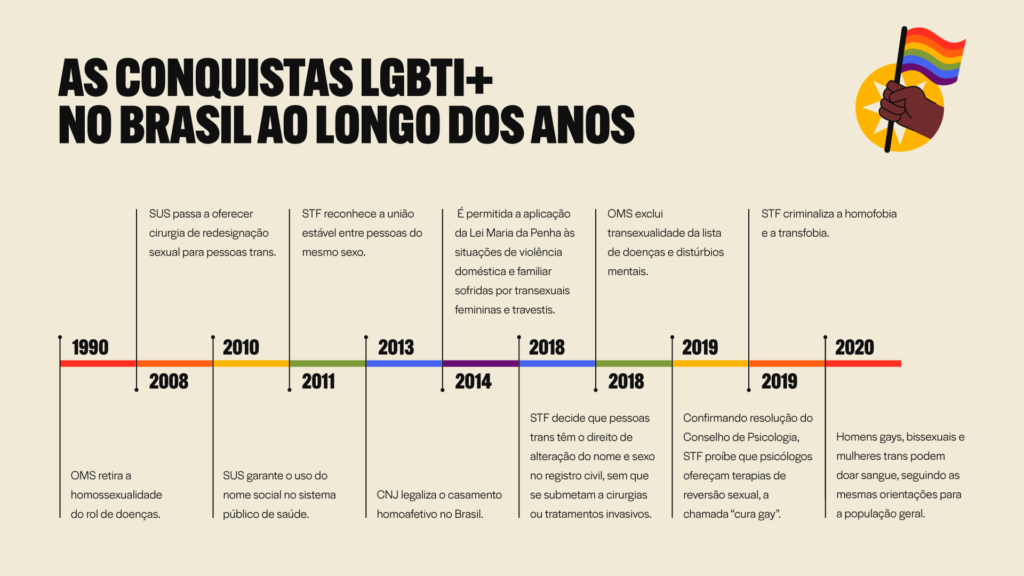LGBTI+ rights: progress and difficulties in the fight for citizenship
Despite growing conquests in recent years, LGBT phobia is still a threat to dissenting bodies
 Foto: Marcello Casal/Agência Brasil
Foto: Marcello Casal/Agência Brasil
One morning, Ágata Mostardeiro found herself becoming the adoptive mother of her own biological son. This Kafkaesque situation came about because the social educator is transsexual. When Ágata´s baby was born, they could not be registered as having two biological mothers because the standard form for declaring a live birth only has spaces for one mother and one father.
In the same year, the STF (Supreme Federal Court) had permitted that transsexual people would be able to change their documents in a notary´s office, without the need to present the case in a court. This followed a ruling on the Direct Action of Unconstitutionality (ADI 4275). Ágata, who started the gender transition process after the conception of her baby with her partner at the time, changed her papers in order to be recognised as feminine gender. But she was prevented from registering the baby as the biological mother.
She agreed to appear as the adoptive mother on the birth certificate, so the new born baby would be covered by her health insurance. It was only in 2020, after going through a series of uncomfortable experiences in the judicial system – like having to prove her genitalia (which she did not do because she found it humiliating) – that the Rio Grande do Sul courts finally recognised her as the biological mother of the child who had had her DNA from the start.
Read more
Symmy Larrat, President of ABGLT (The Brazilian Association for Lesbians, Gays, Bisexuals, Transvestites and Transsexuals) believes that obtaining rights through the STF creates an unusual situation when it comes to applying them. “People find it difficult to understand points that are not stipulated in legislation, even when they are legally binding. It is difficult to apply these conquests in real life.” She says.
In recent years, important progress has been made in the country, in the fight for the rights of LGBTI+ people and the principal ones have been through the STF. For example: in 2018, as mentioned above, it was decided that trans people would be able to change their documents without having to undergo sexual reassignment surgery; in 2019, homophobic and transphobic behaviour was criminalized; in 2020, a measure that restricted blood donations by gay and bisexual men, transvestites and trans women was removed and common-law marriage between same sex couples was recognised in 2011. In addition, the public health service (SUS) transsexualization process became a reality, although there are some difficulties in gaining access to it. Nonetheless, dignity and inclusion still seem to be a distant dream.
“In the last ten years, we have experienced recognition of a series of rights, mostly stemming from public policies by the executive and the STF. So, formally we have gained the principal rights of the LGBQIA+ community.” Said Renan Quinalha, Researcher and Law Professor at Unifesp (Federal University of São Paulo). “The problem is that materially and in practice we still have some ground to cover. This is because rights have to spread down through the whole system in order to become a reality nationwide.”
Quinalha reinforces the need to change mentality along with work on access to justice and awareness about rights in order to fight this ambiguity which still means Brazil ranks as one of the most threatening countries for LGBTQIA+ people in the world. It is not by chance that, in 2020, the Grupo Gay da Bahia (Gay Group of Bahia) recorded the violent deaths of 237 LGBTI+ people, 94.5% of which were murders and 5.5% suicides.

Moreover, so far in 2021, at least four attacks on trans and black parliamentarians have been recorded. These were both virtual and physical threats as well as persecutions. According to the Marielle Franco Institute, black women, trans people and transvestites became the target of political violence after they took up positions in power. A piece of research, “Political Violence against Black Women”, carried out with the support of Global Justice and Terra de Direitos, showed that 98.5% of the 142 black women who signed the Agenda Marielle in the 2020 elections have suffered aggression, such as harassment and psychological, racial and gender violence.
“These reactions are the response of racist transphobic conservatism, that has never accepted black women, trans women and transvestites in spaces of power, but merely as sexual objects, recognised only as bodies and not as political people who think and express themselves.” Said Jaqueline Gomes de Jesus, Psychology Professor at the Instituto Federal do Rio de Janeiro and President of the ABEH (the Brazilian Association for Homo-cultural Studies) “People think women in office are a threat to the position of white cisgender men, who are supposedly heterosexual, as the only representatives of the population.”
Gomes de Jesus says it is important that those who enjoy the privilege of being considered normal also recognise their diversity. The idea that a particular group is seen as fully human and universal places anyone outside this group in sub-human categories.
This is why Symmy Larrat, at ABGLT, sees the conquest of LGBTI+ rights as a victory for everyone. “When we promote inclusion, we are building and retrieving our humanity.” She believes. “We must talk about that which is not being said, so we can create relationships that are more respectful and do not exclude anyone. This is how a society becomes more humane.”






